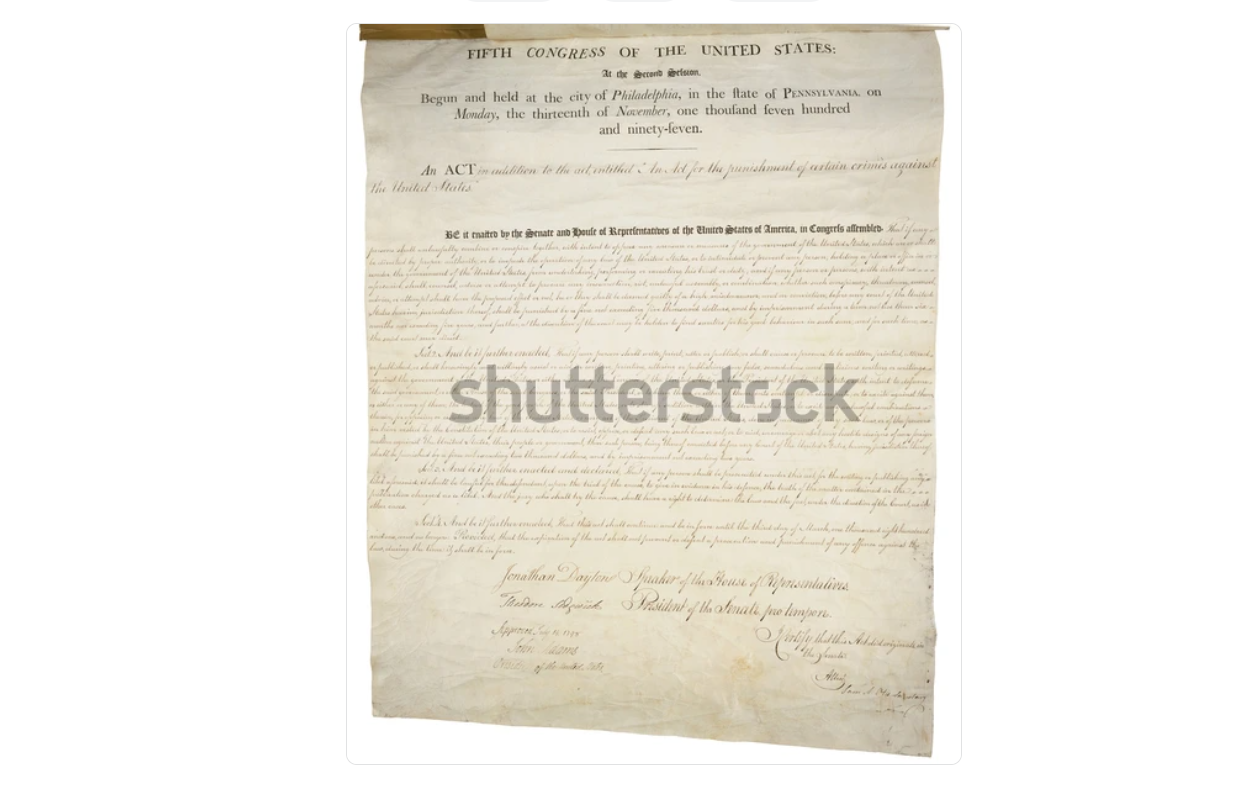The Alien and Sedition Acts of 1798 stand as one of the most controversial moments in early American history. Passed during the presidency of John Adams, these four laws sought to strengthen national security in response to perceived threats, particularly from immigrants and dissenters critical of the government. However, the acts quickly became a flashpoint for debates about civil liberties, government overreach, and the balance of power in a young republic. In this article, we will explore the context, content, and lasting impact of the Alien and Sedition Acts, delving into their significance for American democracy and civil rights.
Read Also : The Battle of Fort Sumter (1861): The Spark that Ignited the Civil War
Introduction to the Alien and Sedition Acts
The Alien and Sedition Acts were passed during a time of heightened political tension and international conflict. The young United States, still finding its footing as a nation, was caught in the crossfire of European power struggles, particularly between France and Great Britain. Domestically, the country was deeply divided along partisan lines, with the Federalists and Democratic-Republicans vying for control over the direction of the nation. The Alien and Sedition Acts reflected these pressures, but their passage also revealed the fragility of civil liberties in times of crisis.
The Political Context of the Late 1790s
The late 1790s were a period of political turmoil in the United States. The Federalist Party, led by President John Adams, feared that the country was under threat from foreign influences, particularly from France, which was then embroiled in the French Revolution and its subsequent wars across Europe. Relations between the U.S. and France had deteriorated, leading to the quasi-war—a series of naval conflicts that fell short of full-scale war.
Internally, the U.S. faced intense political division. The Federalists, who favored a strong central government, were in power, but the Democratic-Republicans, led by Thomas Jefferson and James Madison, championed states’ rights and individual freedoms. The Federalists believed that dissent, particularly from immigrants and critics of the government, posed a threat to national security, while the Democratic-Republicans saw this as an infringement on personal liberties.
This atmosphere of fear and political strife laid the groundwork for the passage of the Alien and Sedition Acts. The Federalists, seeking to quell dissent and protect national security, viewed these acts as necessary measures. However, to the Democratic-Republicans, the laws represented an unprecedented attack on free speech and the rights of immigrants.
The Four Laws that Comprised the Acts
The Alien and Sedition Acts were composed of four distinct laws, each targeting different aspects of national security and political dissent. These laws were:
- The Naturalization Act: This act extended the residency requirement for immigrants seeking U.S. citizenship from 5 years to 14 years. Federalists argued that immigrants, many of whom supported the Democratic-Republicans, were a destabilizing force and needed to be monitored for a longer period before becoming citizens.
- The Alien Friends Act: This law allowed the president to deport any non-citizen deemed dangerous to the country, even in peacetime. It gave the executive branch sweeping authority over immigration without requiring any judicial oversight.
- The Alien Enemies Act: This act gave the president the power to deport or imprison any male non-citizen over the age of 14 from a hostile nation during times of war. Unlike the other acts, this law remains on the books today, having been used during World War II to justify the internment of Japanese-Americans.
- The Sedition Act: Perhaps the most controversial of the four laws, the Sedition Act made it illegal to publish “false, scandalous, and malicious writing” against the government or its officials. This law was used primarily to target journalists and political opponents of the Federalist Party, stifling free speech and press freedoms.
These laws were enacted in quick succession in 1798, and together, they represented one of the most direct assaults on civil liberties in American history. Their passage reflected the Federalists’ fear of internal subversion, but they also exposed deep divisions within the country about the limits of government power and the protection of individual rights.
Federalist Justifications for the Acts
The Federalists justified the Alien and Sedition Acts by arguing that they were necessary to protect the young republic from internal and external threats. They believed that immigrants, particularly those from France and Ireland, were sympathetic to revolutionary causes and could pose a threat to national security. The extension of the naturalization period and the president’s new powers to deport were seen as essential measures to control the influence of foreign nationals on American politics.
The Sedition Act, in particular, was justified as a way to curb the spread of dangerous ideas that could undermine the government during a time of crisis. Federalists believed that criticism of the government weakened national unity and emboldened America’s enemies. In their view, the Sedition Act was not an attack on free speech, but a necessary step to protect the country from misinformation and disloyalty.
However, the Federalist justifications for these laws were met with fierce opposition, especially from the Democratic-Republicans, who saw them as unconstitutional and an abuse of power. The debate over the Alien and Sedition Acts reflected the broader ideological divide in the early republic between those who favored a strong central government and those who prioritized individual liberties and states’ rights.
Democratic-Republican Opposition to the Acts
The Democratic-Republicans, led by Thomas Jefferson and James Madison, were vehemently opposed to the Alien and Sedition Acts. They viewed the laws as a blatant violation of the First Amendment, which guaranteed freedom of speech and the press, and as an unconstitutional expansion of federal power. The Sedition Act, in particular, was seen as a tool for silencing political opposition and suppressing the free exchange of ideas.
Jefferson and Madison responded to the Alien and Sedition Acts by drafting the Kentucky and Virginia Resolutions, which asserted that states had the right to nullify federal laws that they deemed unconstitutional. These resolutions laid the groundwork for the doctrine of states’ rights, which would later be invoked in debates over slavery and secession. Although the resolutions did not lead to the immediate repeal of the Alien and Sedition Acts, they underscored the deep ideological divide in the country and the ongoing tension between federal authority and states’ rights.
The Democratic-Republicans also fought back in the court of public opinion, arguing that the Alien and Sedition Acts were an assault on the core principles of the American Revolution. They warned that if the government could suppress dissent and deport immigrants at will, the United States was in danger of becoming a tyranny. This opposition played a key role in the 1800 election, in which Jefferson defeated Adams and the Federalists, marking a significant shift in American politics.
The Aftermath and Legacy of the Alien and Sedition Acts
The Alien and Sedition Acts, though short-lived, had a profound impact on American political culture and civil liberties. Their legacy continues to shape debates about the limits of government power, free speech, and the rights of immigrants. In this section, we will explore the immediate consequences of the acts, their eventual repeal, and their long-term implications for American democracy.
The Repeal and Expiration of the Acts
The Alien and Sedition Acts were highly controversial from the moment they were passed, and their unpopularity contributed to the downfall of the Federalist Party. The acts were intended to be temporary, with most of their provisions set to expire in 1801. Following the election of Thomas Jefferson in 1800, the Democratic-Republicans moved to repeal the remaining laws and roll back the Federalists’ attempts to centralize power.
The Sedition Act, which had been used to prosecute several prominent journalists and political figures, was allowed to expire in 1801, and those who had been convicted under the law were pardoned by Jefferson. The Naturalization Act was repealed, reducing the residency requirement for citizenship back to five years. However, the Alien Enemies Act remained on the books and would be used during subsequent wars, including World War II.
The expiration and repeal of the Alien and Sedition Acts marked a victory for civil liberties and helped to restore balance between federal authority and individual rights. However, the laws also set a troubling precedent for the suppression of dissent and the expansion of executive power in times of crisis—a precedent that would be revisited in future conflicts, from the Civil War to the War on Terror.
The Impact on Civil Liberties in America
The Alien and Sedition Acts raised important questions about the limits of free speech and the role of government in regulating dissent. The use of the Sedition Act to target political opponents and suppress criticism of the government was a clear violation of First Amendment rights, and it sparked a national debate about the boundaries of civil liberties in a democratic society.
The legacy of the Alien and Sedition Acts can be seen in subsequent legal and political battles over free speech, from the Espionage Act of 1917 to the Patriot Act of 2001. In each of these cases, the government sought to limit speech and civil liberties in the name of national security, and opponents argued that such measures threatened the very freedoms they were intended to protect.
The Alien and Sedition Acts serve as a reminder of the delicate balance between security and liberty in times of crisis. They highlight the dangers of government overreach and the importance of protecting individual rights, even in the face of external threats. The acts also underscore the ongoing tension between federal authority and states’ rights, a tension that would continue to shape American politics in the years leading up to the Civil War.
The Acts’ Influence on the 1800 Presidential Election
The Alien and Sedition Acts played a significant role in the presidential election of 1800, one of the most contentious and consequential elections in American history. The Federalists, led by John Adams, were seen as overreaching and out of touch with the values of the American Revolution. The Democratic-Republicans, led by Thomas Jefferson, positioned themselves as defenders of liberty and the rights of the individual against an increasingly authoritarian federal government.
The election, often referred to as the “Revolution of 1800,” resulted in a dramatic shift in power. Jefferson’s victory over Adams marked the first peaceful transfer of power between political parties in American history, and it signaled a rejection of the Federalist policies that had dominated the 1790s. The Alien and Sedition Acts became a symbol of Federalist overreach, and their unpopularity contributed to the party’s decline.
The election of 1800 also marked the beginning of a new era in American politics, one in which the principles of limited government and individual rights would be at the forefront of national debates. The legacy of the Alien and Sedition Acts, and the backlash they provoked, helped to shape the development of American democracy and the ongoing struggle to balance security and liberty.
The Legacy of the Alien and Sedition Acts
The legacy of the Alien and Sedition Acts is complex and multifaceted. On one hand, the acts represented a significant overreach by the federal government and a violation of the civil liberties enshrined in the Constitution. On the other hand, they highlighted the challenges of governing a young nation in a time of crisis and the tensions between national security and individual rights. In this section, we will explore the long-term impact of the acts on American politics and civil liberties.
The Acts’ Impact on Free Speech and Civil Liberties
The Alien and Sedition Acts had a profound impact on the development of free speech and civil liberties in the United States. The Sedition Act, in particular, was seen as a direct assault on the First Amendment, and its use to target political opponents set a troubling precedent for the suppression of dissent in American politics.
The debate over the Alien and Sedition Acts also helped to clarify the boundaries of free speech in the United States. The acts sparked a national conversation about the role of government in regulating speech and the importance of protecting individual rights in a democratic society. This debate would continue to shape American politics and law in the years to come, influencing everything from the Supreme Court’s interpretation of the First Amendment to the passage of subsequent sedition and espionage laws.
The legacy of the Alien and Sedition Acts is a reminder of the fragility of civil liberties in times of crisis and the importance of vigilance in protecting the rights of individuals against government overreach. The acts also serve as a cautionary tale about the dangers of allowing fear and political expediency to override the principles of liberty and justice.
The Influence on Future Debates over Government Power
The Alien and Sedition Acts set a precedent for the expansion of government power in times of crisis, a precedent that would be revisited in future conflicts. The acts demonstrated how fear and political division could lead to the erosion of civil liberties and the concentration of power in the hands of the federal government.
This precedent was invoked during subsequent periods of national crisis, from the Civil War to World War I, World War II, and the Cold War. In each of these instances, the government passed laws that expanded its authority to regulate speech, suppress dissent, and control the actions of individuals deemed a threat to national security. The legacy of the Alien and Sedition Acts is reflected in these later laws, as well as in the ongoing debates over the balance between security and liberty in American politics.
The influence of the Alien and Sedition Acts can also be seen in the development of the states’ rights doctrine, which would play a central role in the debates over slavery, secession, and the Civil War. The Kentucky and Virginia Resolutions, drafted in response to the acts, laid the groundwork for the argument that states could nullify federal laws they deemed unconstitutional—a doctrine that would later be invoked by Southern states seeking to defend slavery.
Conclusion: Reflecting on the Alien and Sedition Acts
The Alien and Sedition Acts of 1798 remain a pivotal moment in American history, illustrating the challenges of balancing national security with the protection of civil liberties. As we reflect on the significance of these laws, we are reminded of the importance of safeguarding individual rights, even in times of crisis. The debate over the Alien and Sedition Acts helped to define the boundaries of free speech and government power in the United States, and their legacy continues to shape American politics and law today.
The Alien and Sedition Acts as a Test of American Democracy
The Alien and Sedition Acts were a test of American democracy, challenging the nation to balance the demands of security with the principles of liberty and justice. The passage of these laws revealed the fragility of civil liberties in times of crisis, but the eventual backlash and repeal of the acts demonstrated the resilience of American democracy.
The acts also served as a turning point in the early republic, highlighting the deep political divisions between the Federalists and Democratic-Republicans and setting the stage for future debates over the role of government in regulating speech, immigration, and dissent. The legacy of the Alien and Sedition Acts is a reminder of the importance of vigilance in protecting individual rights and the ongoing struggle to define the limits of government power in a democratic society.
The Enduring Legacy of the Alien and Sedition Acts
The enduring legacy of the Alien and Sedition Acts can be seen in the continued debates over free speech, civil liberties, and government power in the United States. The acts serve as a cautionary tale about the dangers of government overreach and the importance of protecting individual rights, even in times of national crisis.
The legacy of the acts also underscores the importance of political dissent in a healthy democracy. The use of the Sedition Act to target political opponents and suppress criticism of the government demonstrated the dangers of allowing the government to regulate speech. The backlash against the acts helped to solidify the principle that free speech is a fundamental right in a democratic society, even when that speech is critical of the government.
As we continue to grapple with the balance between security and liberty in the modern world, the lessons of the Alien and Sedition Acts remain as relevant today as they were in 1798. The acts serve as a reminder of the importance of protecting civil liberties and the need to remain vigilant against government overreach in the name of national security.
Frequently Asked Questions (FAQs)
1. What were the Alien and Sedition Acts of 1798?
The Alien and Sedition Acts were four laws passed by the Federalist-controlled Congress in 1798. They included the Naturalization Act, Alien Friends Act, Alien Enemies Act, and Sedition Act. These laws targeted immigrants and political dissenters, expanding federal power to deport non-citizens and criminalize criticism of the government.
2. Why were the Alien and Sedition Acts controversial?
The acts were controversial because they were seen as a violation of civil liberties, particularly the First Amendment’s protections of free speech and the press. The Sedition Act, in particular, was used to suppress political opposition to the Federalist Party, leading to accusations of government overreach and tyranny.
3. How did the Democratic-Republicans respond to the Alien and Sedition Acts?
The Democratic-Republicans, led by Thomas Jefferson and James Madison, vehemently opposed the acts. They responded by drafting the Kentucky and Virginia Resolutions, which argued that states had the right to nullify unconstitutional federal laws. The opposition to the acts played a significant role in the 1800 election, in which Jefferson defeated John Adams.
4. What was the impact of the Alien and Sedition Acts on civil liberties?
The Alien and Sedition Acts had a profound impact on civil liberties, as they expanded federal power to regulate speech and deport immigrants. The acts sparked a national debate about the balance between security and liberty, a debate that continues to shape American politics and law today.
5. Are any of the Alien and Sedition Acts still in effect today?
The Alien Enemies Act remains in effect and has been used during subsequent conflicts, including World War II. The other three acts, including the Sedition Act, were either allowed to expire or were repealed in the early 19th century.







This site can be a walk-via for all the info you wanted about this and didn抰 know who to ask. Glimpse here, and also you抣l definitely uncover it.
There are certainly a variety of details like that to take into consideration. That may be a great level to convey up. I offer the thoughts above as general inspiration but clearly there are questions like the one you convey up where a very powerful factor will be working in sincere good faith. I don?t know if finest practices have emerged round things like that, but I am certain that your job is clearly recognized as a good game. Both girls and boys feel the impression of just a second抯 pleasure, for the rest of their lives.
You’ve been great to me. Thank you! http://www.ifashionstyles.com
Hey, you used to write excellent, but the last several posts have been kinda boringK I miss your great writings. Past several posts are just a little bit out of track! come on!